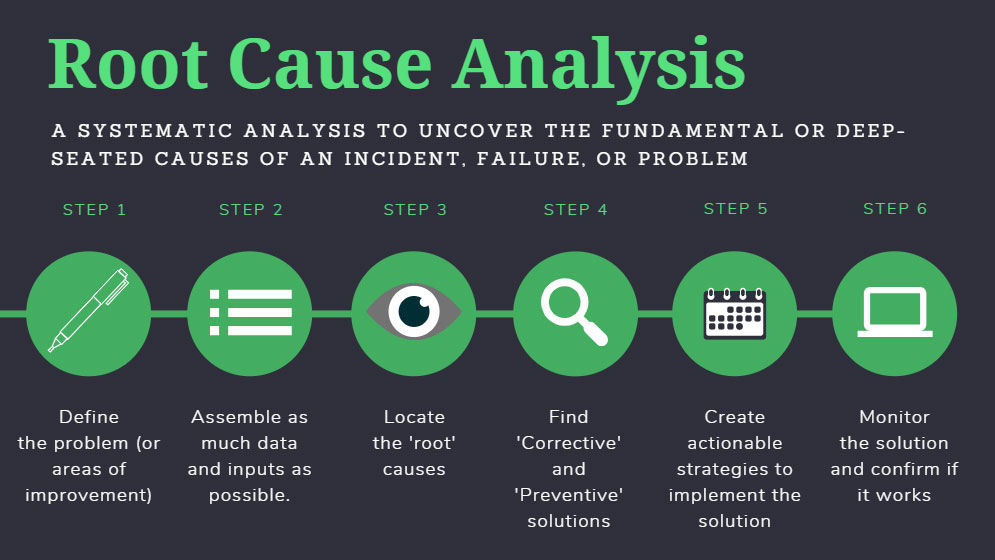Scope
Through a comprehensive understanding of RCA methodologies and techniques, participants will be equipped to navigate the RCA process effectively, from data collection and analysis to identifying root causes and assessing their impact. They will gain proficiency in developing actionable recommendations and implementing preventive measures to mitigate future occurrences.
Module 1: Introduction to Root Cause Analysis
The course begins with an exploration of the fundamental concepts and significance of Root Cause Analysis (RCA). Participants will gain a clear understanding of what RCA entails, its importance in problem-solving, and how it contributes to organizational improvement. Key concepts and terminology will be covered to establish a solid foundation for the subsequent modules. Moreover, the benefits and challenges associated with implementing RCA within organizations will be examined, providing participants with valuable insights to navigate the implementation process effectively.
Module 2: RCA Methodologies and Techniques
This module provides participants with a comprehensive overview of various RCA methodologies and techniques. Participants will be introduced to well-established approaches such as the 5 Whys, Fishbone Diagram, and Fault Tree Analysis. They will learn the step-by-step process of conducting RCA investigations, from gathering relevant data to identifying the most suitable methodology based on specific contexts and scenarios. This module equips participants with the necessary knowledge and skills to apply different RCA methodologies effectively.
Module 3: Tools for Data Collection and Analysis
Effective data collection and analysis are crucial aspects of Root Cause Analysis. Participants will explore proven techniques for gathering data, including conducting interviews, making observations, and reviewing relevant documents. They will also learn how to leverage data analysis tools such as Pareto charts, histograms, and scatter diagrams to extract meaningful insights from collected data. By mastering these techniques, participants will be able to harness the power of data to uncover underlying causes and patterns that contribute to problems and incidents.
Module 4: Identifying Root Causes
This module focuses on the core task of identifying root causes through rigorous analysis. Participants will learn how to apply the 5 Whys technique, which involves repeatedly asking "why" to trace causes back to their fundamental origins. They will also explore the use of Fishbone Diagrams, a visual tool that helps systematically identify potential causes across different categories such as people, processes, equipment, and environment. Additionally, participants will delve into the in-depth analysis of contributing factors using fault tree analysis, enabling them to gain a comprehensive understanding of the underlying causes behind problems and incidents.
Module 5: Assessing and Prioritizing Root Causes
Once the root causes are identified, it is crucial to assess their impact and recurrence likelihood to prioritize the most critical ones for intervention. Participants will learn how to evaluate the significance of identified root causes and employ risk assessment techniques such as the probability-impact matrix and risk priority number. This enables participants to make informed decisions based on severity and the potential for prevention, ensuring that resources and efforts are directed toward addressing the most impactful causes.
Module 6: Developing Effective Recommendations
In this module, participants will learn how to translate the findings of the root cause analysis into actionable recommendations. They will gain insight into crafting recommendations that directly address the identified causes and implement preventive measures and control strategies. Additionally, participants will explore mechanisms for monitoring and evaluating the effectiveness of these recommendations, ensuring ongoing improvement and sustained impact.
Module 7: Communication and Reporting
Effectively communicating RCA findings and recommendations to stakeholders is vital for driving change within organizations. This module equips participants with strategies and techniques to present RCA findings compellingly and concisely. They will learn to create comprehensive RCA reports that effectively communicate insights and recommended actions to diverse audiences. Furthermore, participants will explore strategies for fostering a culture of learning, collaboration, and continuous improvement within organizations through effective communication practices.
Module 8: Case Studies and Practical Exercises
To reinforce learning and practical application, participants will engage in analyzing real-life case studies. These case studies provide opportunities to apply RCA methodologies and techniques to complex scenarios, enhancing participants' problem-solving skills and decision-making abilities. Group discussions and problem-solving exercises foster collaboration and the exchange of ideas, while hands-on practice using RCA tools and approaches enables participants to build confidence and proficiency in conducting RCA investigations.
By the end of the Root Cause Analysis course, participants will have acquired the necessary skills and expertise to systematically identify and address the underlying causes of problems and incidents.

